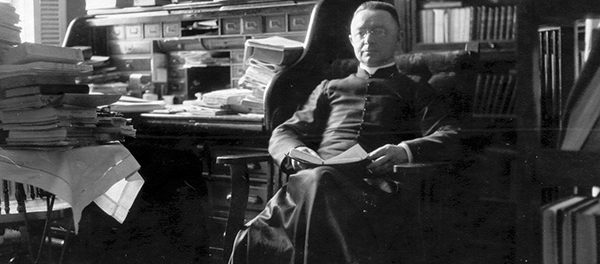1918: Lionel Groulx & Other Quebec Curios
Part of “Shadows and Revolution”, 1900-1960
Lionel Groulx’s political and social thought came from his work and his upbringing. An historian and a priest, as well as a writer, Groulx grew up in the shadow of Henri Bourassa and was immersed in Bourassa’s nationalist ideas. The young Groulx grew up in a religious farming family and received a Classic education at a school that now that bears his name. A student of history, he opposed the traditional English narrative that the Conquest brought the English saviour to French Canada. During the First World War, where he too opposed conscription, he also criticised Confederation, another English Canada success story.
Groulx’s nationalism was conservative, unlike Bourassa’s liberal leanings, preaching the graces of the French-Canadian “race” and a culture where the Catholic church was firmly engrained in society. He believed that the French-Canadians were willed by God and were being aided to their greatness by the Church. Calling on the French Canadians to take charge of their economy and to assert themselves and their culture in an increasingly English Canada, Groulx tread a very fine line between nationalism and sovereignty and for part of his life flirted with the idea of an independent French-Canadian state in order to realise his dream. Bourassa, whose idea of the French Canadians remained within Canada, was quick to call out Groulx as a separatist. Groulx himself would deny the charge, but would be vice president of the Saint Jean Baptiste Society and would be one of the chief editors of L’Action nationale, at the time a nationalist revue that would analyse the cultural realities of the French-Canadians.
Not just a militant nationalist, Groulx’s day job was being a teacher. His education took him around the world, from a doctorate at the Université de Montréal to other graduate studies throughout Europe. During his time as a professor, he would give lectures for the public almost yearly. Taking the education of the new French-Canadian youth in his hands, he created a history class for a new generation from the bottom up. He is one of the people who used the French-Canadian hero Dollard des Ormeaux as a metaphor of the French-Canadian people up against the enemies consisting of the First Nations, English Canada, and “Others” who threatened their survival.
In his lifetime, Groulx would start to see the concrete steps of his dream start to emerge, living long enough to see the Quiet Revolution take place and a new society start to emerge. Lionel Groulx’s nationalism remained strong until the end, even participating in the 1962 election: he was one of many French-Canadian people taking charge of their own destinies. His dream was being fulfilled. One of Groulx’s last public appearances would be in 1967 at the World’s Fair; he would die that same year.






